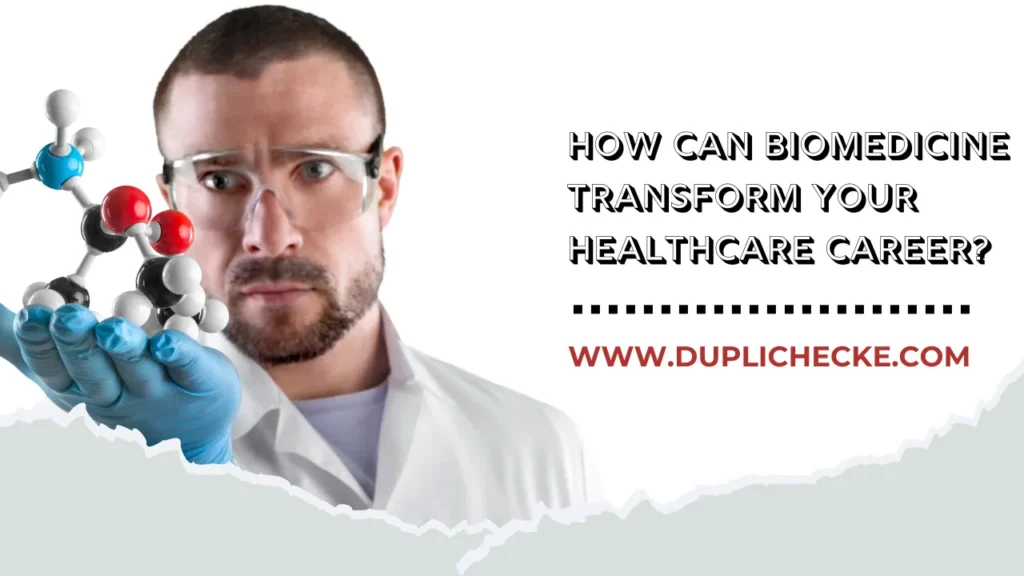Find out how Biomedicine can open doors in your career by exploring recent innovations and new opportunities in the biomedical field!

Biomedicine is a energetic and ever-evolving field that plays a significant part in progressing healthcare. Integrating biology and medicine, this field focuses on understanding and treating diseases, as well as developing new technologies to improve quality of life. If you are considering a career in healthcare, a degree in biomedicine may be the ideal choice for you.
In this post, we will explore how a degree in biomedicine can prepare you to face challenges and seize opportunities in the field, as well as show the latest discoveries and advancements in the field of biomedicine, highlighting the significance of this information for the future of healthcare. Check it out!
The Biomedicine Degree: Preparing for the Future
A biomedicine degree provides a solid foundation in biological and medical sciences, preparing students for a challenging and rewarding career in healthcare.
The curriculum covers a wide range of disciplines, including molecular biology, microbiology, genetics, physiology, and pathology, among others. In addition, students have the opportunity to gain practical skills through internships and research projects.
Career Opportunities in Biomedicine
A degree in biomedicine opens doors to a variety of career opportunities. Some of the areas in which biomedical scientists can work include:
Scientific Research: Biomedical scientists may work in research laboratories, conducting studies to understand diseases and develop new treatments. Academic institutions, pharmaceutical companies, and government research centers are common employers.
Clinical Diagnostics: Biomedical professionals may work in clinical laboratories, performing tests and analyses to diagnose diseases. They play a crucial role in supporting doctors and providing essential information for patient care.
Pharmaceutical and Biotechnology Industry: The pharmaceutical and biotechnology industry offers diverse opportunities for biomedical scientists, from developing new drugs to conducting clinical trials and ensuring quality.
Public Health: Biomedical scientists can contribute to public health by working on disease prevention programs, epidemiological surveillance, and health policy.
Facing Challenges and Seizing Opportunities
Biomedicine is a dynamic and challenging field, and professionals need to be prepared to face a series of challenges. Among them:
Complexity of Diseases: Diseases are complex and multifaceted, requiring an integrated and interdisciplinary approach to their study and treatment.
Technological Evolution: The rapid evolution of medical and biological technologies requires that biomedical professionals stay up to date with the latest innovations and developments.
Ethical Issues: Work in biomedicine often involves complex ethical issues, especially with regard to genetic research and the use of new technologies.
However, the opportunities are vast and rewarding. By addressing these challenges, biomedical scientists have the opportunity to make significant contributions to the health and well-being of society.
The Role of Biomedicine in Health
Biomedicine is essential to understanding and treating a grouping of ailments. Biomedical researchers work to unravel the biological mechanisms that cause disease, developing innovative treatments and improving health care.
To this end, the integration of diverse disciplines, such as genetics, biochemistry, physiology and immunology, allows biomedical scientists to address health problems in a comprehensive and effective manner.
Recent Advances in Biomedicine
Advances in biomedicine have revolutionized the way we diagnose and treat diseases. Some of the most significant discoveries and innovations include:
Gene Therapy: Gene therapy involves introducing healthy genetic material into diseased cells to treat or prevent disease. This technique has shown promising results in treating rare genetic diseases and is being explored for other conditions, such as cancer and cardiovascular disease.
Gene Editing with CRISPR: CRISPR technology enables precise editing of DNA, offering the potential to correct disease-causing genetic mutations. This advancement has significant implications for the treatment of genetic diseases, as well as applications in drug research and development.
Immunotherapy: Immunotherapy employments the body’s possess resistant framework to battle malady, particularly cancer.Therapies such as checkpoint inhibitors and CAR-T cell therapies have shown impressive results in treating specific types of cancer, offering new hope for patients.
Regenerative Medicine: Regenerative medication looks for to supplant or recover harmed cells, tissues, or organs to reestablish ordinary work. Stem cell research and tissue engineering are promising areas that could revolutionize the treatment of injuries and degenerative diseases.
Practical Implications of Innovations in Biomedicine
Innovations in biomedicine have significant practical implications for health. For example:
Early and Accurate Diagnosis: Advanced technologies such as gene editing and gene therapy enable early and accurate diagnosis of diseases, enabling more effective interventions and better outcomes for patients.
Personalized Treatments: Biomedicine allows the development of personalized treatments, adjusted to the specific needs of each patient. This increments the viability of medications and decreases side impacts.
Disease Prevention: Advanced knowledge about the biological mechanisms of diseases allows the implementation of more effective prevention strategies, reducing the incidence of diseases and improving public health.
Conclusion
Biomedicine is a fascinating and vital field that is at the forefront of innovation in healthcare. With a degree in biomedicine, you can prepare for a career full of opportunities, tackling complex challenges and contributing to improving public health. The latest discoveries and innovations in the field offer a glimpse into the possibilities ahead, making it an exciting time to enter biomedicine.